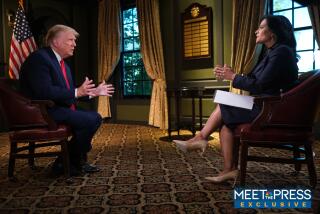Dukakis: Next, the Rough Press
- Share via
WASHINGTON — For Gov. Michael S. Dukakis, it is now morning in America. His New York victory has made him the front-runner, the new party leader. Barring self-induced disaster, Dukakis will be the Democratic presidential nominee. But as his campaign goes from the primary grind to a full-blown national effort, new dangers lurk: The press will get rougher; political moves will be more demanding; the pressures on the staff will intensify, and his message will be challenged as not presidential.
Press scrutiny is inevitable. The winnowing process is complete and the national media will focus on the eventual nominee. Dukakis has largely been spared rigorous media scrutiny, thanks in part to “lightening rod” candidates like Gary Hart, Rep. Richard A. Gephardt, Sen. Joseph R. Biden Jr. and most recently Jesse Jackson, each of whom drew attention and controversy. Except for Jackson, these candidates are no longer stories, but new angles on Dukakis certainly are. He should brace himself for a round of tough press.
His campaign staff will soon be overwhelmed. The phone calls will triple as all sorts of Democrats suddenly fall in love with Greek dancing. The Big Boys, from governors to Capitol Hill staffers, will want “to help” and will have to be dealt with delicately. People from the other campaigns also need to be accommodated. Incorporating these operatives on the Dukakis team is necessary to unify the party and prevent carping from the sidelines. Lyndon B. Johnson once put it well; asked why he had hired a longtime opponent, L.B.J. said, “I’d much rather have that fellow inside my tent pissing out than outside my tent pissing in.”
Intraparty politics will remain central for Dukakis, with Jackson’s role in the campaign and in any future Administration the key to Democratic unity. Dukakis cannot delegate this task. He needs to negotiate directly with Jackson. These talks would not be appropriate until after the Ohio primary in May, but should happen before California in June. If Jackson is not going to be the vice-presidential nominee, the decision should be made early in order to stop any groundswell of support. Jackson backers may well become increasingly stubborn if their candidate continues to lose. Before the vice presidency gets swept up in the emotion of the convention, it should be resolved. That will be made easier by what is, by all appearances, a good relationship between the governor and the minister.
The last of the expected challenges to Dukakis may be his most critical. The candidate must shape a presidential message answering two basic questions: Who are you? And where do you intend to lead the nation? He has already responded to the first by shrewdly making the charges of his lack of charisma work for him. Dukakis has gone far in defining himself publicly with a little self-deprecating humor and remarks like, “I don’t expect to be known as the Great Communicator. I want to be known as a great builder.”
In answering the second question the trap for Dukakis lies in his lack of experience in foreign and defense matters, and in his tendency to take a legalistic approach to questions of national security.
That Dukakis has so far run a positive campaign, kept his message broad and not antagonized groups within the party will serve him well in coming days. Moving from “three yards and a cloud of dust” primary elections to leadership of his party and country will test his abilities. Not much more of a test, in reality, than what he’s already accomplished.
More to Read
Get the L.A. Times Politics newsletter
Deeply reported insights into legislation, politics and policy from Sacramento, Washington and beyond. In your inbox twice per week.
You may occasionally receive promotional content from the Los Angeles Times.


![1988: The image of George H.W. Bush towering over his Democratic opponent, Massachusetts Gov. Michael Dukakis, might be the second-most notable contrast in debate history (after the first Nixon-Kennedy debate). What you might remember: At the start of the second meeting held at UCLAs Pauley Pavilion -- CNN newsman Bernard Shaw asked Dukakis, an opponent of the death penalty, one of the more shocking questions in debate history: Governor, if [your wife] Kitty Dukakis were raped and murdered, would you favor an irrevocable death penalty for the killer? Dukakis bland response sealed his fate in the general election. What you might have forgotten: Just about everything else in the two debates.](https://ca-times.brightspotcdn.com/dims4/default/039226c/2147483647/strip/true/crop/586x392+0+17/resize/320x214!/quality/75/?url=https%3A%2F%2Fcalifornia-times-brightspot.s3.amazonaws.com%2F79%2F73%2F27f118f5a47485c01012372b100f%2Fla-pres-debate1988-i5paygkf)







